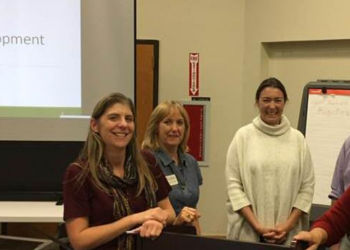The development of shared-use processing spaces has created new opportunities for small and emerging food businesses to develop and create new products. However, this audience has historically had challenges navigating food safety regulation and compliance, and there is a strong lack of educational materials and training to support them. Key concepts from the FDA recognized Food Safety Preventive Controls Alliance (FSPCA) Preventive Controls for Human Food curriculum will be modified to fit the target audience, and combined with other food safety and product development concepts to provide a focused, customized training to food entrepreneurs to aid in their understanding of critical food safety considerations from concept to commercialization. This program will contain input from stakeholders across the Northeast, to develop and implement a sustainable food safety training program, customized to small and emerging food businesses, to increase knowledge in food safety and enable entrepreneurial success in the marketplace.
Project Goals & Objectives:
The overall goal of this project is to develop and implement a sustainable food safety training program customized to small and emerging food businesses that will help increase their knowledge in food safety and enable entrepreneurial success in the marketplace. The objectives to achieve this goal include:
- Conduct a needs assessments pecific to food safety educational and training opportunities necessary to support small and emerging food businesses (to meet new FSMA guidelines for processing systems)
- Develop a curriculum and online training tools, field a pilot test, and evaluate the food safety educational program that addresses the needs specific to small and emerging food businesses that will enable FSMA compliance
- Implement a sustainable food safety program specific to small and emerging food businesses that will enhance a food safety culture throughout the product development process
Relevance:
Providing a food safety knowledge base for small and emerging food businesses specific to their needs can help to enhance a food safety culture throughout the product development process. Establishing a food safety culture from the start (product concept) helps to reduce risk, maximize efficiency and maintain quality throughout the process and into commercialization.
Outputs & Extension Materials:
- Past Programming:
- Pilot Trainingsto small and emerging food businessesin NY & RI (Fall 2019): 28 participants
- February Train-the-Trainer (TTT) in PA (Winter 2020; Virtually, October): 33 participants; 12 participants
- Virtual Training with SEFB (July, Nov): 24 participants
- Future scheduled sessions
- Published Extension Materials:
- 2-day training course(8 modules), titled “Successful Food Product Development for New Food Businesses: Managing Food Quality & Safety”, which covers concepts related to food safety, product development, product labeling, and food safety regulation. Developed for in-person and virtual delivery.
- Online, self-paced version “Successful Food Product Development for New Food Businesses: Managing Food Quality& Safety” (going live end of 2020/early 2021)
- 1 day, in-person or virtual Train-the-Trainercourse to teach instructors the best way to teach curriculum material. Developed for in-person and virtual delivery
- Online tools including
- Example of a Food Safety Plan- CookieFoodSafetyPlan
- Food Safety Plan template for a small scale operated chocolate chip cookie
- Food Product Estimated Start Up Expenses- FoodProductEstimatedStartUpExpenses
- Working list of cost estimates associated with developing a new food product
- Food Quality and Safety Case Studies- CaseStudiesforQualityandSafetyModuleExplanations
- Study demonstrating the importance of following the scheduled processes for product safety, veryifying the equilibrium pH of the finished product, and having defined ingredient attributes for the safety of the product
- Recipe to Formula Conversion Worksheet- RecipeConversionWorksheet
- Step-by-step instructions on how to set up a Google Sheet for recipe conversions
- Food Safety Resource folder
- Substantiating Product Claims Case Study (still in draft form)
- Example of a Food Safety Plan- CookieFoodSafetyPlan
- Research paper: Richard, N., Pivarnik, L., Von Achen, C., Kinchla, A.J. Knowledge, attitudes, and implementation of food safety practices among small food businesses operating at shared-use kitchens.Food Protection Trends. Accepted. No. FPT-20-018R1.
Support:
This work is supported by the Food Safety Outreach Program grant no. 2017-04978 project accession no. 1014003 from the USDA National Institute of Food and Agriculture.
Acknowledgements:
The collaborating team would like to acknowledge the support provided by the contributors below for their help throughout this project. These contributors were instrumental in helping to recruit participants for the survey, promoting programming, and providing content review.
- Northeast Center to Advance Food Safety
- Regional food processors & shared use facilities
- Western Massachusetts Food Processing Center, Greenfield, MA
- Hope & Main, Warren, RI
- CommonWealth Kitchen, Dorchester, MA
- Mad River Food Hub, Waitsfield, VT
- Advisory Board
- Dr. Bruno Xavier, Cornell University Extension
- Jennifer Stott, Farm Fresh Rhode Island
- Elizabeth Newbold, Director of NECAFS
- Chris Callahan, University of Vermont Cooperative Extension
- Angela Montalbanoo
- Zoe Lloyd, Fire Ox Foods
- Bill Cavanaugh, Mad River Food Hub
Resources
- Bad Bug Book
- Control of Listeria Monocytogenes in Ready-to-Eat Foods
- Hazard Analysis and Risk Based Preventive Controls for Human Food
- FDA Small Entity Compliance Guide
- Food Labeling Guide 2013
- Food Safety Plan Template
- Food Safety Preventive Control Checklist
- Reference Database for Hazard Identification
- Food Recall Maual Ver2
- Validation and Verification Framework for Industry
